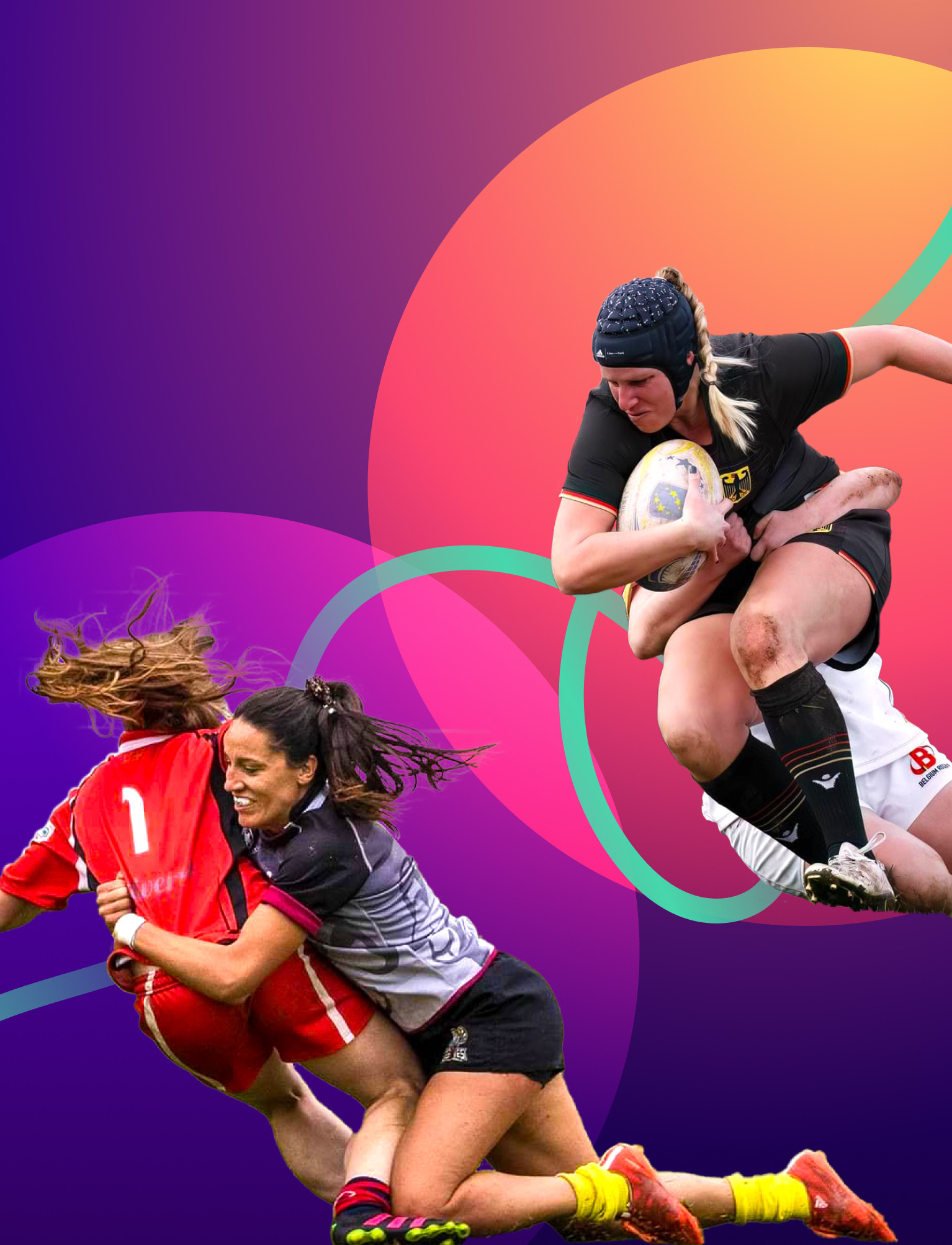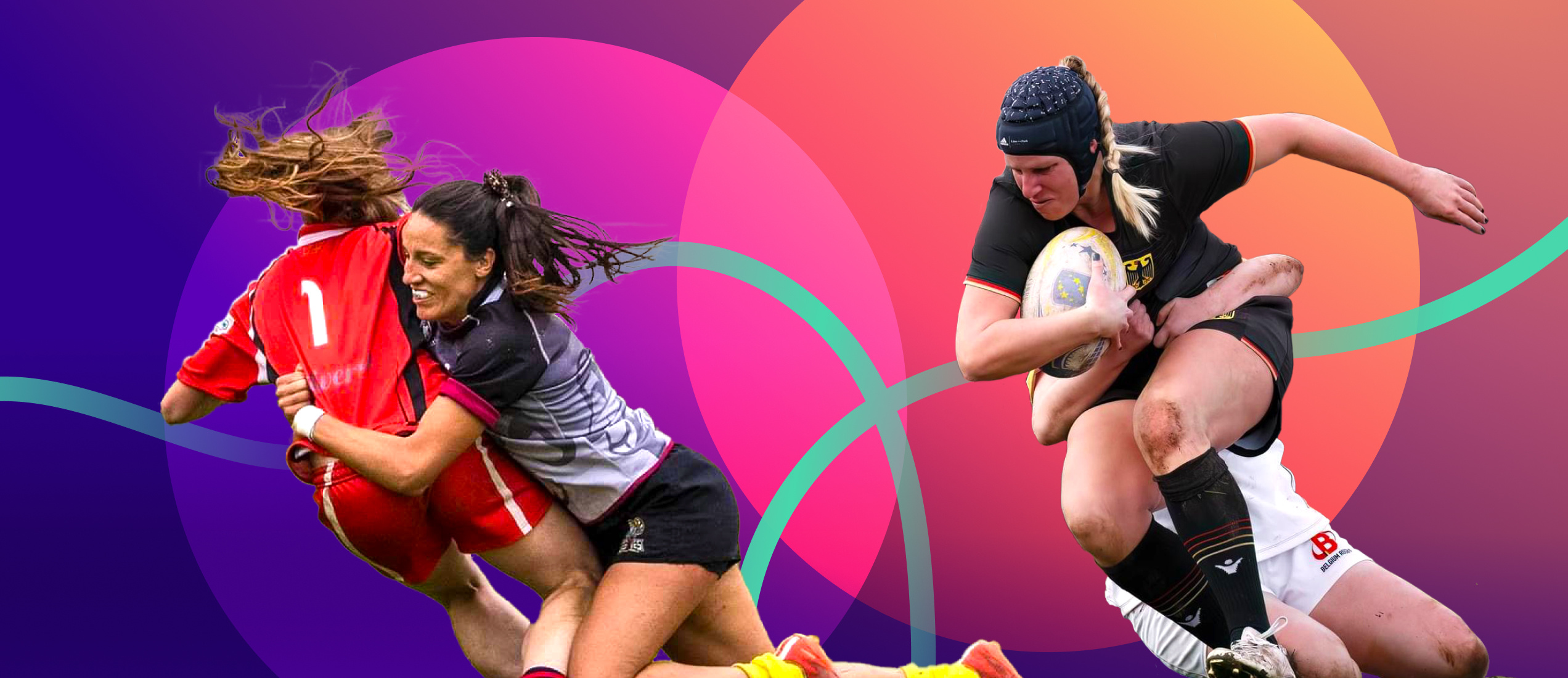In this edition of Nagarrians at Play, we talk with Julia Rettig, Director of Global Go-to-Market SAP at Nagarro, and Alysha Stone, a Marketing Specialist at Nagarro, to explore their rugby experiences on and off the field.
For Julia and Alysha, rugby isn’t just a sport, it’s a battlefield of resilience, teamwork, and unshakable passion. What started as a curiosity, quickly became a lifelong pursuit for these two women, taking them from local club rivalries to national teams and international competitions. But their journey wasn’t just about winning games—it was about proving themselves in a male-dominated sport, pushing their limits, and building a global rugby family.
But how did their journeys begin? What drew them to rugby, and what kept them hooked despite the challenges? From the intense physicality of the game to the deep camaraderie it fosters, Julia and Alysha open up about the highs, the hardships, and the invaluable lessons they’ve carried beyond the field. Their passion for rugby extends far beyond competition—it’s a story of resilience, growth, and success in both sport and life.
Hello Julia, Alysha. I am curious, how did you both first get into rugby, and what drew you to the sport?
Julia: I started playing when I was around 17 – previously I was really into track & field, gymnastics, and handball. At one point I felt like I needed to try something new and one of my teachers at that time suggested rugby. To be honest, I did not know a lot about the sport. All I knew was that the workouts were grueling because my math teacher, who introduced me to the sport, would always have us calculate patterns of exercises they did in rugby. Eventually, she persuaded me to give it a shot. And I haven’t looked back once.
 Julia in action during an intense rugby match
Julia in action during an intense rugby match
Alysha: My story is similar to Julia’s. I started playing rugby at 13, only discovering the sport because my younger siblings were already involved. After quitting high-performance gymnastics at 11, I was looking for a new sport and tried tennis and track & field before finally finding rugby. Although I spent my first year on the field without really knowing what I was doing or what I was supposed to do, I quickly fell in love with the game and especially the camaraderie.
Wow! Was there a specific moment when you realized rugby was more than just a hobby for you?
Julia: I can't point at a specific moment but right from the start, I was embraced by the team and even though I had no clue at all, everyone was very supportive and hyped me up. The team, the club, the veterans, everyone treated me as one of theirs and I quickly built friendships with my teammates and fellow rugby players. I think this is one of the very unique things in rugby, even traveling abroad and meeting other rugby players—you always kind of belong. Rugby is a very physical sport, and you really need to rely on your team to make it work. Being a great individual player won’t matter as much as it does in other team sports, in my opinion.
Alysha: The truth is, I’ve never experienced another sport, like rugby. The sense of teamwork goes far beyond what I had known before—it's not just about playing together, but truly relying on and pushing each other, both on and off the field. The bonds you build are unlike anything else.
Coming to a specific moment or time-period, I was fortunate enough that at just the age of 20, I was able to take this passion to the next level and pursue rugby professionally, working towards qualifying for the 2016 Olympic Games. Although that dream didn’t come true, it was one of the most challenging and rewarding times of my life. Turning a hobby into a career is a rare opportunity, and despite the ups and downs, I wouldn’t trade that experience for anything.
.jpeg?width=750&height=766&name=Alysha%20playing%20at%20her%20old%20club%2c%201.%20Division%20National%20rugby%2015s%20league%20game%20(highest%20division).jpeg) Alysha playing for her old club, Division 1 Rugby 15s League (the highest division)
Alysha playing for her old club, Division 1 Rugby 15s League (the highest division)
You both were part of local rugby teams and participated in various competitions. Can you share more about those experiences and how they shaped your journey in the sport?
Julia: Alysha and I both played in Heidelberg for quite some years in opposing teams. It was kind of funny because we would be going out partying together and then face off against each other on the pitch later. But we also played for our regional team and the national team together. I always loved this variety, playing on club, regional, and national level because even though the basic structure was always similar, the people you played with brought such a different style. I was also playing in the US for the New York Rugby Club, Eugene Rugby Club, and the University of Oregon.
Alysha: It’s funny because Julia and I used to play against each other before becoming teammates on the regional and national teams! It shows how you can be rivals on the field and friends off it.
Playing for local rugby teams was the foundation of my journey. It taught me teamwork, discipline, and resilience while helping me sharpen my skills and build lifelong friendships. And it doesn’t matter where you play (I played in Australia and Spain), the rugby community is like a big family, always welcoming. Those experiences shaped my approach to higher-level competition, reinforcing that success isn’t just about individual performance, it’s about growing together as a team. I carry that mindset with me to this day.
 Caught amidst the chaos:
Caught amidst the chaos:
Julia (kneeling, 1st left) and Alysha (standing, 1st right) as part of the German National team
Rugby is known for its intensity and teamwork. How do you handle the physical and mental demands of the game?
Julia: I think if you take practice and strength training seriously, you can mitigate a lot of physicality. But this is crucial, you need to know what your body can handle. In rugby there are players with all kinds of body types. Mentally, it’s like with every other sport: you need to get in the game. I’d say it’s the same for other team sports where you need to remember team calls and game plan. In the end, you really need to take it seriously and put in the work.
Alysha: Rugby is known for its intensity and teamwork, but it's also a very inclusive sport with different body types and roles. To handle the physical and mental demands, I focused on building strength and stamina through consistent training. It’s about pushing through pain and fatigue, while also knowing when to rest and recover. Mental toughness is key—staying focused, managing pressure, and keeping a positive mindset. The diversity in body types and roles on the field also highlights the importance of teamwork. Each player brings something unique and that makes facing challenges easier. It’s about trusting the process and relying on the team to get through the toughest moments.
Can you describe your most memorable match and what made it so special?
Julia: There is not a single one, to be honest. Every finale match for the German championships was a memorable match, especially the ones we got to win.😊 But there was also my first regular match after my pregnancy. There were some complications when I gave birth to my son and afterwards there were weeks where I was doubting if I was ever going to play again. Being back on the pitch then felt amazing. Also, I was nominated for the German national team after having stepped back almost 15 years ago. That was also a match that really moved me.
 Julia sharing a moment with her team on field
Julia sharing a moment with her team on field
Alysha: I’m torn between my very first match and one of my most cherished memories. My first match was chaotic—I had no idea what I was doing and was running around like a headless chicken. But the support from my teammates blew me away. They took the time to explain everything to me when they could’ve just put me on the bench. That’s the true spirit of rugby!
One of the highlights of my career was definitely playing alongside my best friends, but even more so with my sister. Sharing the same passion is already rare and special, but both of us becoming professionals and competing together at the highest level is something I can't even put into words. I feel like I didn’t fully realize how special that was back then, but I was incredibly fortunate to have shared that experience with her!
Is there a specific skill or mindset from rugby that you think benefits you most in your career?
Julia: I think resilience is a major mindset skill I learned from rugby. But also that a lot is about knowing what your role is and establishing structure. Practice is a lot about ideal scenarios, in the end, we will not execute the exact game play when there is an opportunity to score obviously, but you need the structure to work as a team.
Alysha: For sure! Rugby teaches you resilience like nothing else. You get knocked down, literally and figuratively, but you have to shake it off, get back up, and keep pushing forward. That mindset has helped me so much in my career. It also teaches you the true meaning of teamwork. In rugby, you can’t win alone—you have to trust your teammates, communicate, and have each other’s backs. That’s exactly how it works in the workplace too. The best results come when everyone is aligned and working together.
And honestly, handling pressure. In rugby, you’re constantly making split-second decisions while everything around you is chaos. Learning to stay calm, thinking fast, and adapting have been game-changers in my professional life too.
_NagarriansAtPlay.jpeg?width=750&height=462&name=Alysha%20in%20action%20with%20other%20players%20of%20the%20regional%2015s%20rugby%20team%20of%20Catalonia.%20(Their%20team%20won%20the%202023%20championship%20in%20Madrid.)_NagarriansAtPlay.jpeg) Alysha in action with other players of the regional 15s rugby union team of Catalonia.
Alysha in action with other players of the regional 15s rugby union team of Catalonia.
(They won the 2023 championship in Madrid.)
Rugby is sometimes seen as a male-dominated sport, but women’s rugby has become one of the sport’s greatest success stories, with unprecedented growth around the world. What challenges have you faced on your journey, and how has your experience contributed to the growth of the sport?
Julia: There is a lot of momentum in women’s rugby with awesome role models like Ilona Maher, Ellie Kildunne, or Portia Woodman-Wickliffe (just to name a few). I always thrive in challenging environments, and I love to talk about rugby, that’s hopefully how I contribute to the growth. Also, I hope younger girls consider me a role model while deciding on what sport to choose. Because rugby is awesome!
Alysha: One of the biggest challenges has been fighting for equal recognition and opportunities. When I started, women’s rugby didn’t have the same visibility or resources as the men’s game, and we constantly had to prove that we belonged. From limited funding—sometimes even paying out of pocket to compete with the national team—to fewer professional pathways, the road wasn’t always easy.
But that struggle also fueled my passion. Every time we stepped on the field, we weren’t just playing for ourselves, we were playing to push the sport forward. I’ve been lucky to be part of a generation that has helped break barriers, inspire younger players, and show that women’s rugby is just as fast, physical, and exciting. Seeing the sport grow and knowing I played even a small role in that progress is something I’m incredibly proud of.
 Alysha with the national team during the Rugby 7s European Cup 2024 in Hamburg, Germany
Alysha with the national team during the Rugby 7s European Cup 2024 in Hamburg, Germany
That’s incredible! Can you tell me what’s the best thing about rugby that you wish more people knew?
Julia: That it’s not a brutal or disrespectful sport. Honestly, I have never experienced fair play and fairness in general as much as I did with rugby. It’s a physical sport, but it’s in no way mindless aggression.
Alysha: My favorite thing about rugby is the deep sense of camaraderie and respect within the sport. It’s more than just a game—it’s a family. No matter where you go in the world, the rugby community welcomes you with open arms. The physicality and intensity on the field are matched by friendships and support of it. I wish more people knew how inclusive and empowering rugby is, especially for women. It teaches resilience, trust, and the true meaning of teamwork in a way that few other sports do.
On an ending note, what advice would you give to young girls who dream of playing rugby professionally, especially in a field that’s still growing for women?
Julia: Show up and do the work. Be consistent. And don’t worry if you lose—sometimes the games you lose teach you more than the ones you win. I strongly believe that failure is the best teacher!
Alysha: I would tell them to embrace the journey, even when it gets tough. Rugby is more than just a sport—it’s a community that will push you, support you, and shape you in ways you never imagined. Work hard, trust yourself, and don’t be afraid to take up space. The women’s game is growing, but it still needs trailblazers. Be one of them. Stay resilient, surround yourself with people who believe in you, and most importantly, enjoy every moment on the field.
NagarriansAtPlay is a series that showcases Nagarrians following their passions. In this series, we bring to you some of our remarkable colleagues who have made it big globally in their respective fields, and have inspired many to follow their dreams.







